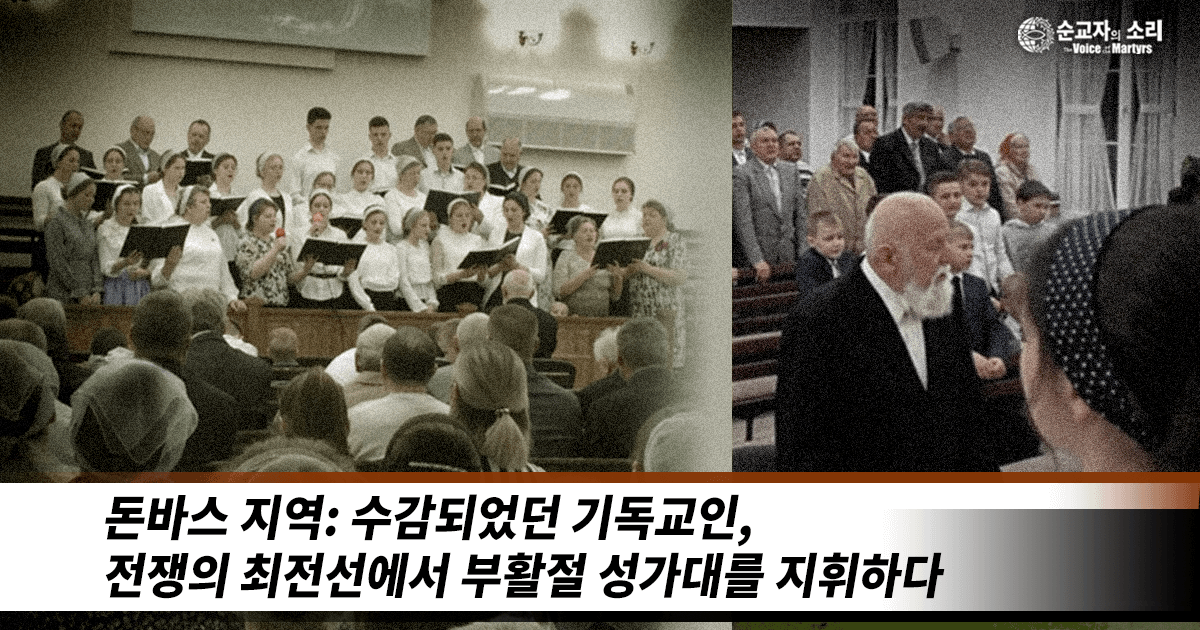
DONBAS: FORMER CHRISTIAN PRISONER CONDUCTS EASTER CHOIR ON THE WAR’S FRONT LINE
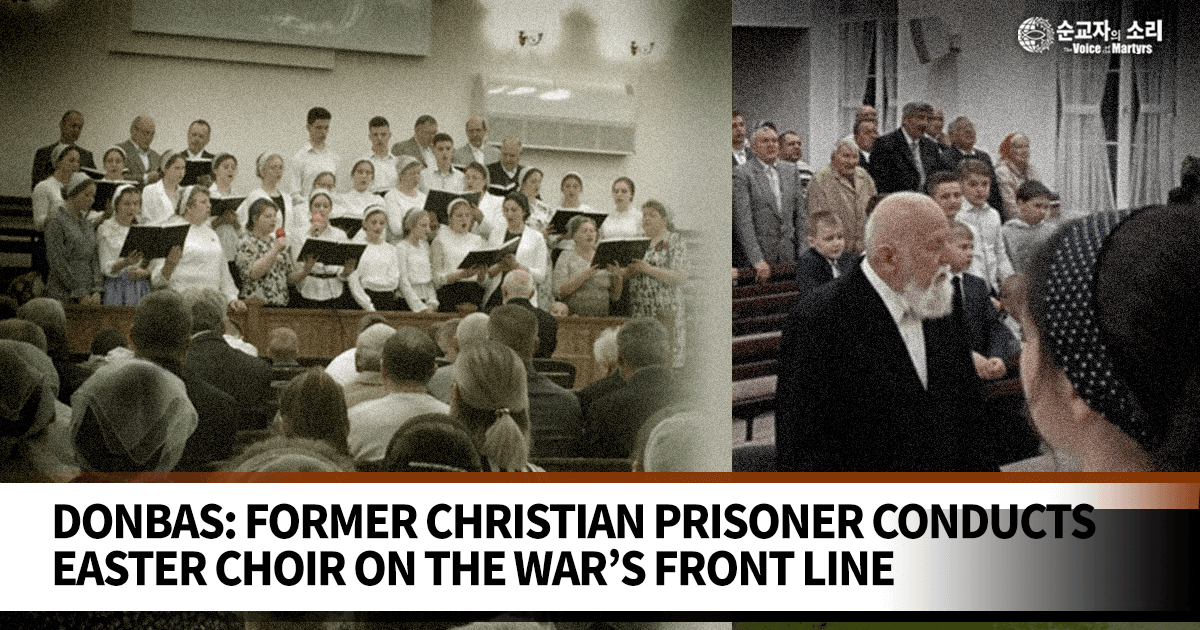
Probably some of the youngest attendees who saw the old man seated in a chair at the front of their church sanctuary conducting the choir on Easter Sunday did not know who he was.
And according to Voice of the Martyrs Korea Representative Dr. Hyun Sook Foley, that is exactly the way the old man prefers it.
The old man is 82-year-old Evgeniy Pushkov. The church is his beloved Baptist house of prayer in the city of Khartsyzsk in the Donetsk region. It is located 30 km from the current front line of the conflict between Russia and Ukraine. Rockets regularly fly into the city, though residents are not always sure from where or whom.
“Pushkov himself was born near Moscow to Christian parents,” says Representative Foley. “At first he rejected Christianity and instead pursued his dream of becoming a professional musician. Yet he says it was his conscientious study of Marx, Engels, and Lenin that ultimately led him back to Christianity, and it was his arrival in the city of Khartsyzsk in Donetsk in 1975 that led him to embrace a new dream. He discovered that the local residents were good singers. So he decided to organize a Christian choral music ministry in Khartsyzsk.”
It is a goal to which he has remained committed for 42 years, including 11 years spent in prison and exile beginning in 1980 as a result of his efforts.
Pushkov is the former presbyter, or leader, of the Khartsyzsk church. Now that age has slowed him, two others fill that role.
“He told us his legs are getting weak, so he has to sit as he conducts the choir,” says Representative Foley. “But he says he can still stand in the pulpit when he is called on to preach.”
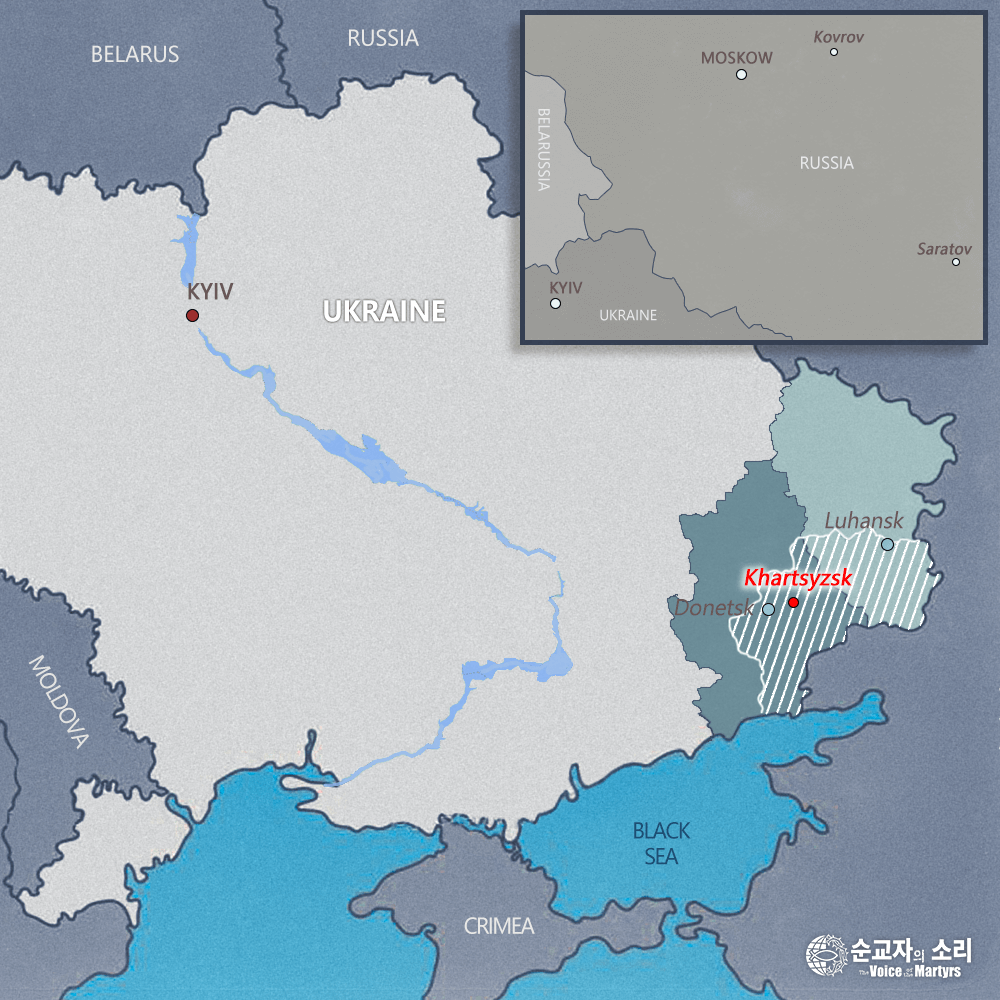
Pushkov’s daughter told Voice of the Martyrs Korea that she thinks it is important for young Christians to remember faithful Christians from the older generation, like her father. But Pushkov says that modesty and humility are more important, even among the old.
His goal on Easter Sunday, he told Voice of the Martyrs Korea, was simply to make Easter as joyful as possible.
It is a challenging goal to achieve in the midst of the present conflict. Once a congregation of 260 to 280, the church has recently dropped below 150 members. Some have left for Russia, some for Germany, and some for the US. More are planning to leave.
“The issue is not persecution,” says Representative Foley. “The church just heard that they had to register with the government, but they did not do that until now. The local citizens are loyal to the church. Less than a year ago, officials started coming to the church to look for signs of extremist activity. But there is no extremist activity at the church, so the officials just come, check, write some papers, and leave.”
Now citizens and church members alike are leaving as the region struggles with the realities of armed conflict. Of Pushkov’s two sons and six daughters, one daughter passed away, four children have already left, and three daughters have stayed in the city but live separately with their own families. Pushkov used to live with a grandson and his family, but they also have left. So now he lives alone, but his daughters visit him daily. Pushkov told Voice of the Martyrs Korea that he is not going anywhere.
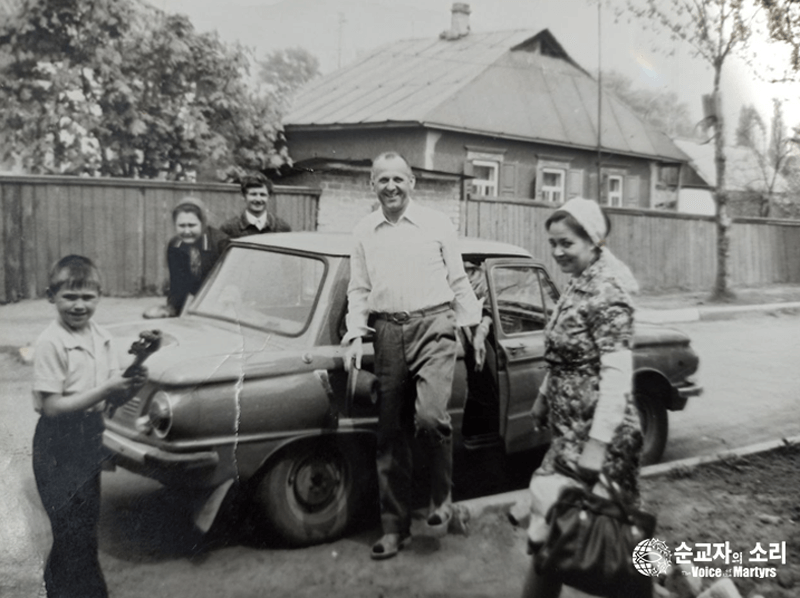
Evgeniy Pushkov arrives home after his first imprisonment of three years. He was only home for 27 days before he was arrested again.
“He told us that at his age he has nowhere to go, but mostly he is concerned about the church,” says Representative Foley.
Pushkov told Voice of the Martrys Korea that his main goal is to ensure that the church maintains its regular services of worship: Twice on Sunday morning, once on Sunday evening, and twice during the week for prayer.
It is a straightforward goal for someone whose journey to faith was anything but straightforward.
“Pushkov was born in the Moscow suburb of Kovrov,” says Representative Foley. “Music was his passion. His mother taught him the Bible as a child, but she died when he was 12.”
Though Pushkov did not become a Christian as a youth, his family’s Baptist background created obstacles to his dream of pursuing music as a profession.
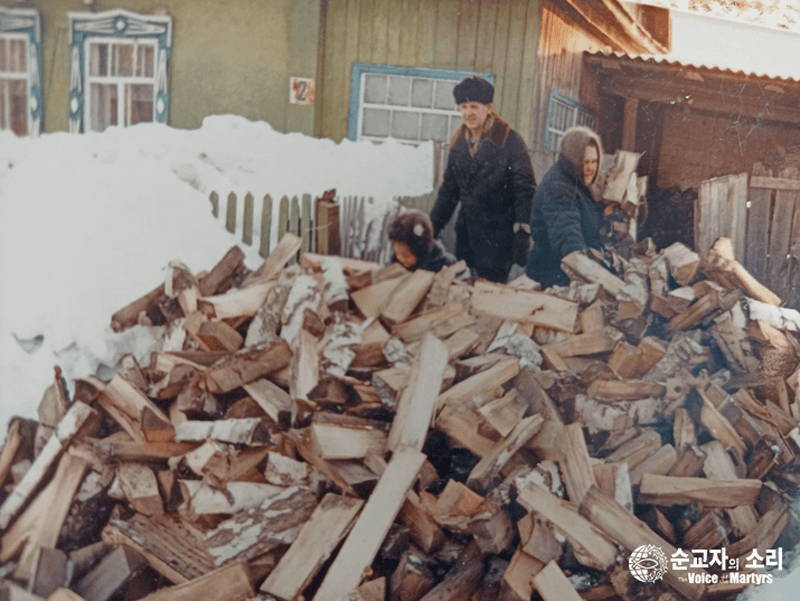
Evgeniy Pushkov while in exile in the Tomsk region in Siberia.
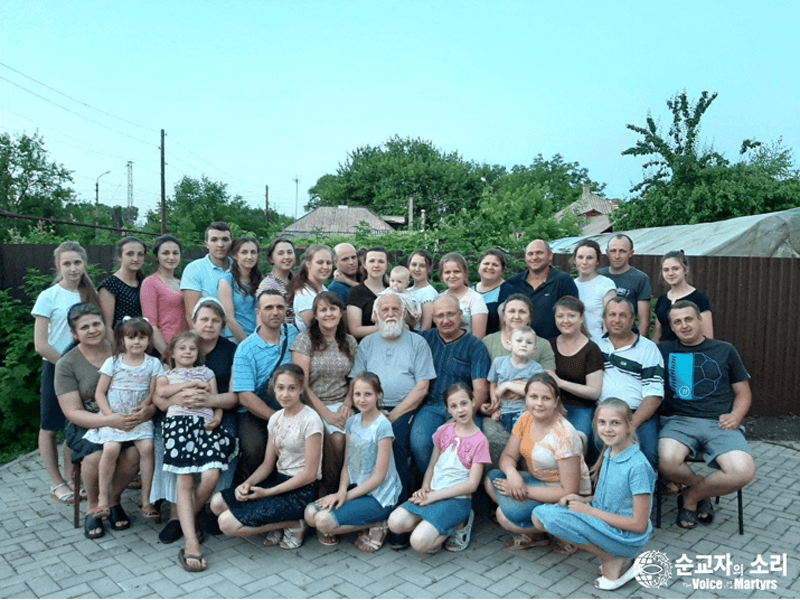
Evgeniy Pushkov is in the center surrounded by his family.
“When Pushkov entered the Saratov musical conservatory, a KGB agent met him and told him he knew he was from a Christian family,” says Representative Foley. “The agent said he would be kicked out of college unless he cooperated with them.”
Pushkov found a solution to the dilemma: graduate as an external candidate. External candidates still had to complete coursework on communism and atheism. But these had an unexpected impact of Pushkov: They led him to become a Christian.
“Pushkov had to write a paper on Marx and Engels for a school competition,” says Representative Foley. “As he did the research, he was surprised to find out that until the age of 30 Marx and Engels were Christians. He learned that they had written books on theology which had not been translated into Russian, and he learned that at the end of his life, Engels actually returned to the Christian faith.”
Pushkov says, “While working on this paper, I did not move away from God. On the contrary I became closer to Him, because I clearly saw how shaky the foundation of atheism was. It turns out that neither Marx, nor Engels, nor other materialists have a single work that refutes the existence of God.”
After Pushkov submitted the paper he was able to graduate. According to Pushkov, the KGB agent who had threatened him previously met with him again, asking the basis for his conversion to Christianity. Pushkov answered, “Marxism-Leninism.”
“I began to tell him that I was born into a Christian family, that I had a little faith in my heart, but then in our area atheists ruined the entire community: almost everyone was thrown into prison, and the rest left,” says Pushkov. “At the age of 16 I went to study, and there I completely forgot about God. But here, people of your circle told me that there are works of scientists that completely refute the existence of God and answer all questions. I began to study them conscientiously. And I will tell you now that in their scientific works I did not find anything that could refute the existence of God. We parted amicably, although he let me know, that he would send all information about me to the place of my new residence.”
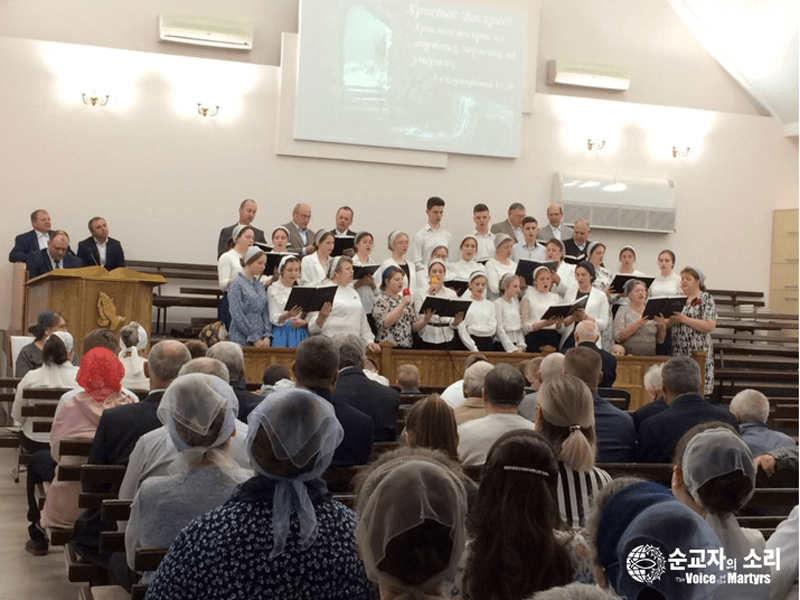
Evgeniy Pushkov (seated, back to the congregation) conducts his “people who stayed” choir at the Khartsyzsk Baptist church on Easter Sunday.
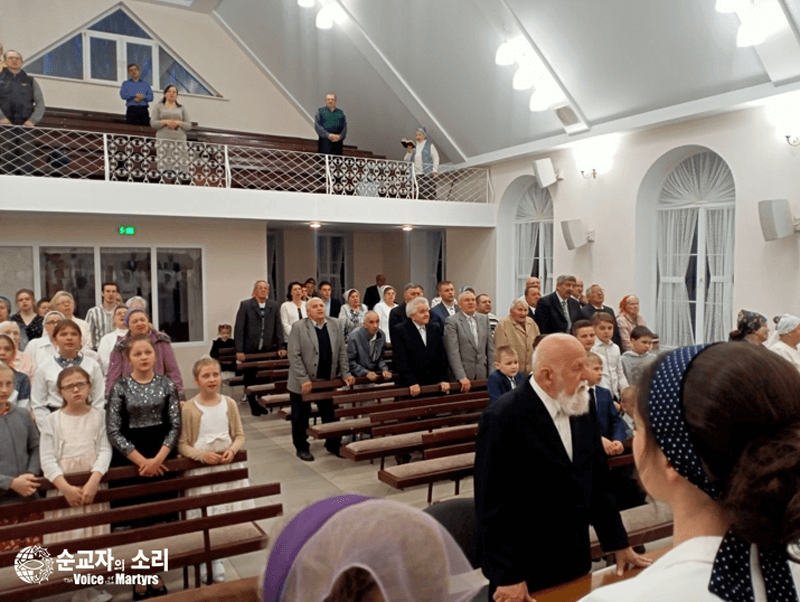
Evgeniy Pushkov (standing, back to the congregation) conducts his “people who stayed” choir at the Khartsyzsk Baptist church on Easter Sunday.
Pushkov was baptized in the church in Saratov at the age of 26. He worked for three years as a secular musician but ultimately decided to devote his musical gifts to God alone.
According to Pushkov, the first thing he did after making his decision was to visit his mother’s grave.
“I arrived there early in the morning,” Pushkov says, “Tears squeezed my throat. I fell on the grave mound and wept for a long time. I prayed, ‘Mommy, get up, get up dear! You wanted so much for me to play the violin and glorify the Lord… Mom, get up… I’ll play for you the way I’ve never played for anyone before! But the hill was silent, and my heart sank from late repentance.”
Representative Foley says that if Pushkov’s repentance was late, it was perhaps for that reason even more deep. “He came to Khartsyzsk in 1975, and he loved the singing of the people there,” says Representative Foley. “He became an ordained evangelist and conducted regional youth meetings in the forest on public holidays. He was caught, arrested, sent to prison for three years, came back home for 27 days, got arrested, and spent five more years in prison, this time in a gulag in the Ural mountains. Even after that he was exiled to Siberia for three years. But he returned to Khartsyzsk as soon as he was permitted to, and he has never left.”
Now, as a result of the present conflict in the region, many families have left. But on Easter, Evgeniy Pushkov decided to assemble a choir from the remaining choristers, as well as from those who had never sung in the choir before.
“Pushkov told us that he doesn’t even call the group a choir. He just calls it ‘people who stayed’,” says Representative Foley.
Pushkov’s “people who stayed” sang four hymns at the Easter service. Two were Easter hymns, and two were hymns encouraging repentance. One of the hymns can be viewed at… www.youtube.com/watch?v=p2L3RuSnMUc
“We asked him how the congregation reacted, and he laughed and said he didn’t actually know,” says Representative Foley. “He said the goal was to glorify God.”
Representative Foley says that Voice of the Martyrs Korea is continuing to administer its Ukraine Christian Emergency Relief project to aid churches and Christians in the region with their ministries. VOMK is also continuing to distribute Families of Martyrs funds to surviving family members of Christians in the region who are killed in the act of Christian witness. Those who are interested in making a donation to either fund can do so at www.vomkorea.com/en/donation or via electronic transfer to:
국민은행 (KB Bank) 463501-01-243303
예금주 (Account Holder): (사)순교자의소리
Please include the word “Ukraine” or “Families of Martyrs” with the donation.

